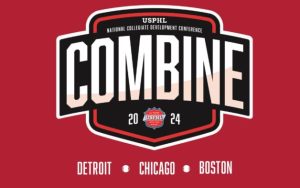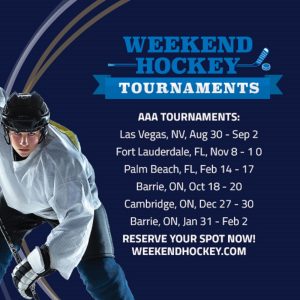Ice Den boasts all levels of skating, hockey as athletes start path to success

When it comes to learning to skate or learning to play hockey, the Ice Den programs have it all as prospective players can follow whichever path they choose to reach their ice sports goals.
The programs begin with individuals as young as 2 ½ and go up through the teenage years and even adults.
So yes, anything you want, the Ice Den has it.
Dawn Piepenbrink-McCosh is the director of the Learn to Skate program at Ice Den Scottsdale and said the structure of the programs offered at both Ice Den Scottsdale and Ice Den Chandler are ideal for anyone interested in ice sports..
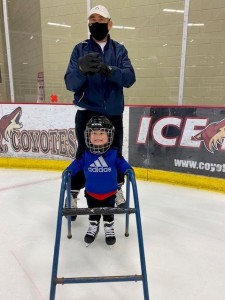 “Our program offers an introductory Parent & Pup class for skaters age 2 ½ – 5 years old,” Piepenbrink-McCosh said. “This is a great way to start the little ones on the ice with the comfort and safety of a parent or guardian. From there, skaters advance throughout the skating levels, based on United States Figure Skating curriculum taught by PSA rated coaches, to Snowplow Sam for 4- and 5-year-old kids and into the basics of skating for skaters starting at age 6 on up to adult. Skaters continue to develop into more advanced skating levels that teach jumping and spinning for all ages.
“Our program offers an introductory Parent & Pup class for skaters age 2 ½ – 5 years old,” Piepenbrink-McCosh said. “This is a great way to start the little ones on the ice with the comfort and safety of a parent or guardian. From there, skaters advance throughout the skating levels, based on United States Figure Skating curriculum taught by PSA rated coaches, to Snowplow Sam for 4- and 5-year-old kids and into the basics of skating for skaters starting at age 6 on up to adult. Skaters continue to develop into more advanced skating levels that teach jumping and spinning for all ages.
“After completing the intro skating classes, aspiring hockey players can enroll in our Pre-Hockey program at age 4 on up which features three levels to develop strong skating skills with equipment and sticks before moving onto our more advanced Initiation Program (IP) which teaches hockey skills, game play, rules and full-ice drills. Following the structured progression of our Learn to Skate program into our figure skating program and Developmental of Youth Hockey and IP program has led to successful skaters in both figure skating and hockey in the Valley.”
Ice Den vice president or programming and skating Julie Patterson said Ice Den Scottsdale has had numerous national and international competitive figure skaters that “started their first wobbly steps in the Learn to Skate program” and continued their skating careers by representing the Coyotes Skating Club of Arizona and Team USA, winning several accolades.
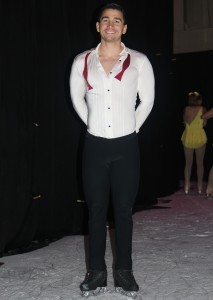
MAX AARON
One competitor is Max Aaron, the 2013 U.S. national champion, the 2015 Skate America champion, the 2011 U.S. national junior champion, and a three-time U.S. International Classic champion. Aaron announced his retirement from figure skating on April 19, 2018, and now gives back to the program by coaching both figure skaters and hockey players.
Another claim to fame is Matthew Tkachuk, currently playing in the NHL with the Calgary Flames, who started at age 2 ½ in the Parent & Pup program when his father, Keith, was captain of the then-Phoenix Coyotes.
Tara Patterson serves as the Ice Den director of administration and Learn to Skate manager at Ice Den Chandler and said the program, besides being a blast, is a great, cost effective way to try a new sport, socialize, beat the Arizona heat, and stay physically active.
“As skaters progress, they can navigate the path towards competitive hockey or figure skating, where our coaches continue to grow their confidence in the skills required for those disciplines,” Patterson said. “There are many individuals currently on our coaching staff who started in the Learn to Skate program as toddlers, as well as those who competed in figure skating locally, regionally, nationally and internationally. Others have performed with Disney on Ice and other ice shows. My personal goal at the most basic level is for skaters to enjoy it, and every time they return, I feel the goal is achieved.
“As the Chandler Learn to Skate manager, I do not directly coach for CAHA, but we are a closely-knit coaching team that combines our skating knowledge and coaching styles to provide the best pathway to success for our skating community. The synergy that exists between the skating and hockey programs combined with the facilities provides an unmatched foundation for individuals interested in either sport.”
Scott Munroe (Chandler) and Scott Gruber (Scottsdale) are Coyotes Development Program (CDP) directors and get to work with those players that are passionate about the game of hockey.
The CDP program works with kids all the way from beginner up to Bantam and provides players an opportunity to learn the game of hockey and develop the skills needed to play the game. Some use it as a launching pad into tier-level hockey.
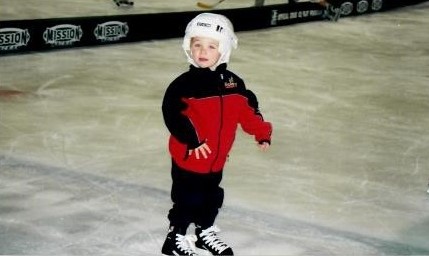
MATTHEW TKACHUK
“The program offers kids an opportunity to play hockey in a fun and low-stress environment,” Munroe said. “We work with kids of all skill levels and we have seen many players join us in our entry level classes and work their way all the way up to the travel level. It is very gratifying to see a player grow and develop.
“As a coach, the most rewarding thing is to see players improve and move forward in their hockey career. To have the opportunity to coach hockey in the state of Arizona has been incredible. To have the ability to help grow the game here has been a very enjoyable experience so far.”
In addition, the CDP program provides camps and clinics to players as well as CDP league play.
“We have a fantastic and dedicated group of coaches with us who care about our program and our players,” said Munroe. “Having the Arizona Bobcats and Jr. Coyotes programs with us in our buildings also provides our players the opportunity to get familiar with travel hockey and learn the commitment and investment it takes to get there.”
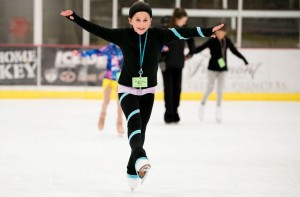 “I believe our specialization is creating that love of the game,” added Gruber. “We don’t only focus on creating strong hockey players. We also look to create great young respectful people. I believe it is hard to gauge the benefits of our program. Benefits are in the eye of the beholder, and the benefits of our program are most likely a variety of items depending on who you ask. Youth hockey really teaches a lot of life lessons. The biggest benefit I see is our leadership group. We have the most incredible group of volunteer coaches in our program, and we can’t do what we do without them. I like to refer to them as unpaid professionals.”
“I believe our specialization is creating that love of the game,” added Gruber. “We don’t only focus on creating strong hockey players. We also look to create great young respectful people. I believe it is hard to gauge the benefits of our program. Benefits are in the eye of the beholder, and the benefits of our program are most likely a variety of items depending on who you ask. Youth hockey really teaches a lot of life lessons. The biggest benefit I see is our leadership group. We have the most incredible group of volunteer coaches in our program, and we can’t do what we do without them. I like to refer to them as unpaid professionals.”
Gruber added that overall, the CDP is always about the players.
“Our program prepares the kids who are ready to make the next step,” Gruber said. “We feel it’s really about the player. If the player is motivated and focused, they will achieve what they believe. Skill development is a huge part of what we do. The biggest thing holding the recreational player back is ice time. A developmental player falls behind the travel player simply because of the lack of ice touches. It’s not what our coaches are doing or not doing, it’s a lack of ice time.”
 Like his colleagues, Gruber said coaching in Arizona is a wonderful experience.
Like his colleagues, Gruber said coaching in Arizona is a wonderful experience.
“I believe it’s a privilege to coach anywhere,” said Gruber. “Just like anything, coaching could be taken for granted, but not for me. Coaches influenced my whole childhood through college. I still refer to them, keep in touch with some. A bunch of us from high school are still in touch with our coach, and we even went skiing in Telluride (Colo.) with him a few years ago. Coaches have a huge obligation to these families, and that needs to be realized by all coaches.
“Coaches end up being dinner table talk, and us coaches need to ensure it’s a positive talk. The privilege to coaching in CAHA is that you don’t have to shovel out your car to get to the rink.”
For additional information on hockey and skating programs at the Ice Dens, visit www.coyotesice.com.
— Matt Mackinder
(Dec. 4, 2020)
_______________________________________
This article presented by…


